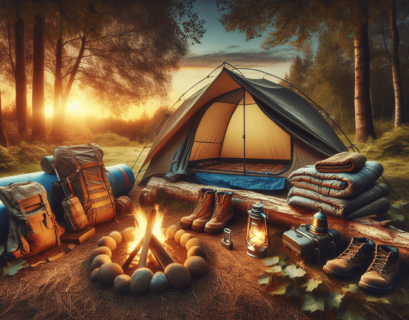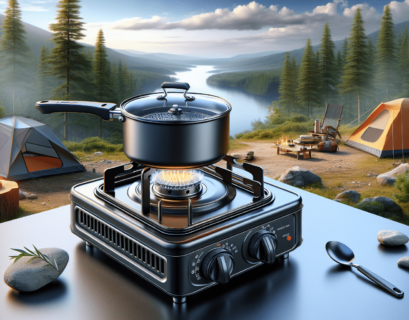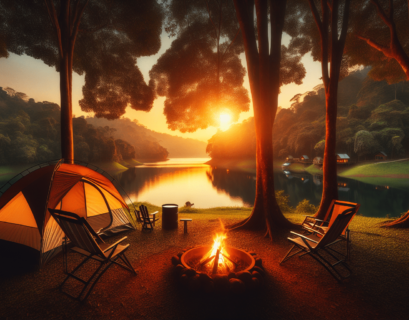If you’re planning a camping trip and want to make sure you’re prepared for any situation that may arise, look no further than this survival gear packing guide. Whether you’re a seasoned camper or a beginner, having the right tools and equipment can go a long way in ensuring your safety and comfort in the great outdoors. From essential items like a reliable tent and sleeping bag to emergency supplies such as a first aid kit and water purification tablets, this guide will help you pack everything you need for a successful and stress-free camping experience. So grab your backpack and get ready to embark on your next adventure, fully equipped and ready for anything!
Importance of Proper Packing
Proper packing is essential when it comes to camping and outdoor adventures. By understanding the fundamentals of packing and organizing your gear, you can ensure a smoother and more enjoyable experience. Having a well-organized pack not only saves you time and energy but also ensures that you have everything you need in case of an emergency. Additionally, packing according to the weather and camping location can make a significant difference in your comfort and safety during your trip. In this article, we will explore the importance of proper packing and provide valuable tips to help you pack efficiently for your next camping adventure.
Understanding the fundamentals of packing
When it comes to packing for a camping trip, there are a few fundamental principles that you should keep in mind. Firstly, it is crucial to prioritize the essential survival gear. These are the items that are necessary for your safety and well-being in the wilderness. Secondly, categorizing your gear can help you stay organized and quickly locate items when needed. Separating your gear into different categories such as shelter and bedding, cooking and hydration, survival clothing, first aid, navigation tools, lighting and fire starter equipment, communication devices, and miscellaneous tools can make packing and unpacking a breeze. Lastly, considering the weather and camping location when packing is crucial. It allows you to choose the appropriate gear and clothing to ensure your comfort and safety in different conditions.
Benefits of well-organized packing
A well-organized pack provides numerous benefits during your camping trip. Firstly, it saves you time and frustration. When everything is neatly packed and categorized, you won’t waste valuable minutes searching for a specific item. This can be especially crucial in emergency situations when time is of the essence. Additionally, well-organized packing helps prevent loss or damage to your gear. By designating specific compartments or bags for different items, you can minimize the risk of misplacing or forgetting essential gear. Furthermore, efficient packing means a lighter load. By streamlining your packing process and eliminating unnecessary items, you can reduce the weight of your pack. This can make a significant difference, especially if you have to hike long distances to reach your camping destination.
Packing according to weather and camping location
Packing according to the weather and camping location is a vital consideration for any camping trip. The gear and clothing you need will vary depending on whether you are camping in a warm or cold climate, near a water source, or in a remote, isolated area. In warmer climates, lightweight and breathable clothing is essential to keep you cool and protected from the sun. In contrast, colder environments require layering options and insulated gear to keep you warm and comfortable. Additionally, if you are camping near a water source, it is crucial to bring appropriate water shoes and waterproof gear. Camping in remote locations may require you to bring additional safety equipment such as emergency beacons or satellite phones. Understanding the specific conditions you will encounter during your camping trip will help you pack appropriately and ensure your comfort and safety.
Essential Survival Gear Overview
Before delving into the details of each category, it is crucial to understand what qualifies as essential survival gear. Essential gear encompasses the items that are vital for your safety and well-being in the wilderness. These items may vary depending on individual needs and the specific camping trip, but there are some general categories that can be considered essential for most outdoor adventures. These categories include shelter and bedding, cooking and hydration, survival clothing and accessories, first aid supplies, navigation tools, lighting and fire starter equipment, communication devices, and miscellaneous tools and equipment. Each of these categories plays a crucial role in ensuring your comfort, safety, and ability to survive in the wilderness.
Categories of essential survival gear
The essential survival gear can be broadly categorized into different categories. Let’s explore each category and the items that fall under them.
Shelter and Bedding
Shelter and bedding are essential for protecting yourself from the elements and getting a good night’s sleep in the wilderness. Camping tents are available in various sizes and designs, such as backpacking tents or family-sized tents. Choosing the right tent depends on the number of people and the specific camping conditions. Sleeping bags and sleeping pads are crucial for providing insulation and cushioning while you sleep. They come in different temperature ratings and sizes to suit your needs. Bivy sacks and hammocks are lightweight alternatives to tents and provide excellent options for solo and minimalist campers.
Cooking and Hydration Gear
Proper nutrition and hydration are vital for your well-being in the outdoors. Camping stoves come in different types, such as propane stoves or liquid fuel stoves, and choosing the right one depends on factors like portability and the type of fuel you prefer. Cookware and utensils should be lightweight, durable, and easy to clean. Water filtration and purification systems ensure that you have access to safe drinking water, even in remote locations. Camping hydration options include water bottles, hydration bladders, and water reservoirs, which allow you to carry water conveniently during your outdoor adventures.
Survival Clothing and Accessories
Choosing the right clothing for your camping trip is essential for your comfort and protection. Layering is crucial, as it allows you to adjust your clothing according to the weather conditions. Base layers, such as moisture-wicking shirts and thermal underwear, help regulate body temperature. Insulating layers, such as fleece jackets or down vests, provide warmth in colder temperatures. Outer layers, such as waterproof and breathable jackets, protect you from wind and rain. Additionally, accessories like hats, gloves, and sturdy hiking boots are essential for protecting yourself from the elements and rough terrain. Specialized protective gear, such as gaiters or hiking poles, can also enhance your camping experience.
First Aid Kit Essentials
A well-equipped first aid kit is a must-have for any camping trip. The contents of a basic first aid kit may include adhesive bandages, sterile gauze pads, antiseptic wipes, adhesive tape, scissors, tweezers, pain relievers, and allergy medication. It is important to familiarize yourself with the use of various first aid supplies and know when to seek medical assistance. Adding personal medications and any specific needs to the first aid kit is crucial to ensure that you have everything you need to address any potential health issues during your camping trip.
Navigation Tools
Proper navigation tools are essential for staying on track and finding your way in unfamiliar territory. Different types of compasses, such as magnetic compasses or lensatic compasses, can help you determine direction and navigate using a map. Camping GPS devices provide accurate navigation, tracking, and location information. However, it is essential to carry physical maps as a backup, as electronic devices can fail or run out of battery power. Understanding how to use these navigation tools ensures that you can navigate confidently during your outdoor adventures.
Lighting and Fire Starter Equipment
Having adequate lighting and fire starter equipment is crucial for your camping trip. Various types of camping lights, such as headlamps, lanterns, or flashlights, provide illumination during nighttime activities or emergencies. Choosing the right fire starter, such as waterproof matches or fire starters, ensures that you can start a fire easily and reliably. It is important to learn about fire safety and practice responsible fire management to prevent accidents and minimize environmental impact.
Communication and Signal Devices
Communication devices and signal devices are essential for staying connected and calling for help in case of an emergency. Two-way radios provide reliable communication between individuals or groups while camping. Signal mirrors and whistles can be used as visual and auditory signals to attract attention during emergencies. It is crucial to establish an emergency contact plan before your camping trip and share it with someone who can assist in case of unexpected situations.
Miscellaneous Tools and Equipment
In addition to the essential categories mentioned above, there are various miscellaneous tools and equipment that can come in handy during your camping trip. Multi-tool kits, such as Swiss Army knives, provide a multitude of functions and can be a lifesaver in unexpected situations. Knowing useful knots, such as the bowline or the clove hitch, can help you secure gear or set up shelters. It is also important to include extra supplies that can be easily overlooked, such as duct tape, zip ties, or extra batteries for your electronic devices.
In conclusion, proper packing and organization are essential for a successful and safe camping trip. Understanding the fundamentals of packing, such as prioritizing essential survival gear, categorizing your items, and considering the weather and camping location, can help you pack efficiently. Additionally, knowing the different categories of essential survival gear, such as shelter and bedding, cooking and hydration gear, survival clothing and accessories, first aid kit essentials, navigation tools, lighting and fire starter equipment, communication and signal devices, as well as miscellaneous tools and equipment, ensures that you have everything you need for a comfortable and enjoyable camping experience. Remember to pack smart, be prepared, and have a fantastic adventure in the great outdoors!






